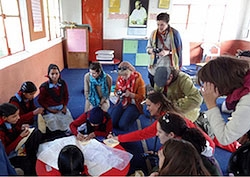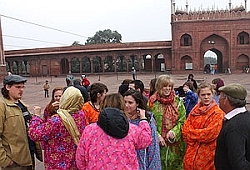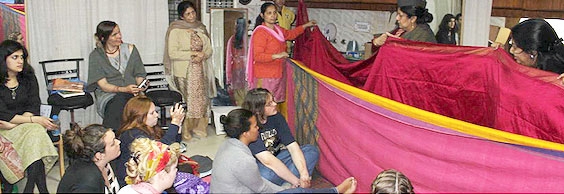| . |
|
. |
|
|


“There’s Nothing Like it!”
Himalayan Gap offers customized, faculty-led, study abroad programs for college-age students that are beyond compare. Designed as short term programs that can take any form -- as a J-Term, an extended spring break, a summer school course, and so on, each study abroad program has its own unique itinerary and curriculum. Grounded in an understanding of the value of site-specific, experiential learning, each curriculum is developed as a collaboration between the vision of the sponsoring faculty member and Himalayan Gap’s directors, Rajiv Lochan and Anu Radha Singh. Our extensive personal and

At BODHSHALA - an NGO run
school
professional contacts all over India and deep understanding of the culture make (just about) everything possible! So dream, and brainstorm away! We work intensely with the faculty member for months (usually up to a year) in advance to carefully design the project while offering innovative ideas and suggestions from our years of experience in the region. At the heart of every program is one basic, animating element: our shared passion to help students from all over the world go “deeper” than the average tourist or the typical “study-abroad at a foreign university” experience and become a life-long student of India.
Our program philosophy includes four active ingredients, which can be expanded, or minimized, depending on your emphasis. Programs can be designed to meet your institution’s curriculum standards for for-credit courses, or alternatively, function as a linked travel-component to an existing course you teach, or finally, a Himalayan Gap study abroad program can be offered as a non-credit, enrichment course, open to a wider audience of students, faculty, and alumni.

Sudhir Thapliyal reading from his novelette, War at Lambidhar
It may be every academic's fantasy, who teach courses relevant to the Indian subcontinent – be they courses on world religion, world literature, global economics, global medicine, fashion design, world cinema, performing arts and so on – to pair a given text or idea with a visit to a specific PLACE, or kind of place. On a typical cloudy Tuesday, in your North American classroom, the idea will present itself: "What if I was teaching x (insert your favorite article, essay, case-study, or novel) THERE?" Himalayan Gap can design a fluid, site-specific curriculum for you, in which class discussions take place just about anywhere: around a campfire on the banks of the Ganges, at a private concert with Sufi musicians, under a tree on the grounds of the Taj, with tea and conversation at the home of a local historian, in the offices of NGOs, in a theater after a play rehearsal, in the garden of an ashram, or in the backroom of a local hospital. The list goes on! More formal settings can also be arranged, of course, but the freedom of this model, with its emphasis on first-hand experiences of India as your classroom, promises an education students will never forget!

Class discussion by a campfire
Himalayan Gap study abroad programs stress the importance of experiencing a variety of landscapes: rural, urban, and wild! Past programs have begun with physical activity (of varying levels): including yoga, trekking, white water rafting, and camping, in order to accomplish two specific goals; 1) to promote group bonding and internal cohesion within the group, and 2) to offer students the kind of heightened experience that engages all five-senses and produces a full-body memory of being fully present to India, a foreign place. Put simply, students leave with sense that they "were really there!" They open themselves up -- body, mind and spirit -- to the experiences in store for them in the rest of the curriculum.

Helping at the Bangla Sahib Gurudwara (Sikh temple) kitchen, which feeds more than 20, 000 people everyday
Service: and Other Forms of Participation
There is no such thing as passive learning on a Himalayan Gap program. Active participation can take several forms, ranging from being invited to participate in religious rituals to taking on the responsibilities of a service project. India's "nonjealous" faiths, such as Hinduism and Buddhism, offer an excellent opportunity for non-believers to participate in profound acts of daily piety, without worrying that they might offend. Students will remember, for example, the exquisite beauty of the aarti, a sunset ceremony performed on the banks of the holy river Ganges that combines live music, chanting, candlelight and twilight.
Besides feeling included in the daily life of "real India," many study-abroad students express the desire to "give back." This is where the service component comes in. Meeting the founders of NGOs, whether they are working on the challenges facing rural education or the problem of children orphaned by AIDS, allows students to begin to think structurally about the causes of social problems and their possible solutions. Time spent volunteering in an orphanage, or a rural school, will deepen your students' understanding of local solutions to global problems. It will also give students permission to make an emotional connection, not just with the culture, but with individuals, whose names and faces and stories, they won't forget.
Hospitality: People to People (Experts, Hosts, Friends)

At the Masjid-I Jahan-Numa
(the "World-reflecting Mosque")
Himalayan Gap understands that ultimately, it's people that make a place meaningful. Rather than lead a "faceless" program, the kind in which students snap photos from the safe distance of a tour bus, Himalayan Gap promises an experience that focuses on building relationships. Organized as a series of private workshops, students will have the chance to meet Indian authors, musicians, artists, yogis, theologians, linguists, NGO activists, and, most importantly, scholars in disciplines specific to the focus of your customized curriculum. Meeting a sitar master, for example, who can teach Hindu theology by explaining the musical theories
behind specific ragas, (all while sharing his art – filling the room with music -- in real time, and in an intimate space), represents holistic learning at its best.
Besides meeting experts in workshop settings, students will have the profound experience of being welcomed into an Indian home as a guest. Hospitality is a profound component of Indian culture, and a key ingredient in any Himalayan Gap program. The ethic that "a friend of a friend is already a friend" informs the way in which our network of hosts engage our students. This is not a job for them, and that makes all the difference! Ensuring that our group stays safe and adequately comfortable is of prime importance to us. To this end, our deep personal involvement with the group during the program enables us to be receptive and attentive to all personal and medical needs of our students and faculty. From keeping the entire group's friends and family posted of our activities on a daily (if not bi-daily) "email/video/Skype newsletter", to providing access to medical care virtually everywhere (with doctors available round the clock on the phone), to spontaneously making peanut butter and jelly sandwiches for the little sense of "home" on a long train ride, we strive to make our students feel secure in a way that precludes any sense of rejection or alienation from the host culture appearing challenging in the wrong kind of way.
Of course, the deepest relationship students will form on a Himalayan Gap program will be with us: the founders and staff of Himalayan Gap, because we will stay with your group 24/7. We are there to solve problems, but also to innovate, to be spontaneous, should a student or faculty member want to add a particular experience or amend a particular day's itinerary. As a family business -- the brainchild of my college-age daughter (and gap year alum), Anchal, my wife Anu, and me (Rajiv), Himalayan Gap represents a highly personalized approach to study abroad that bigger organizations can't duplicate. For Himalayan Gap, facilitating cultural exchange is a personal passion, and seeing students fully and utterly changed by the experience is the best reward possible.

Sari workshop with Rta Chisti, founder of the "Sari School" - learning the wonders of this unstitched garment

At our home in Delhi: girls showing off the "camel pants" we gifted them, the recording of our theme song "Oh India", and Coco, our Sulphur-crested Cockatoo
|
|
|
|
|
|
|
|